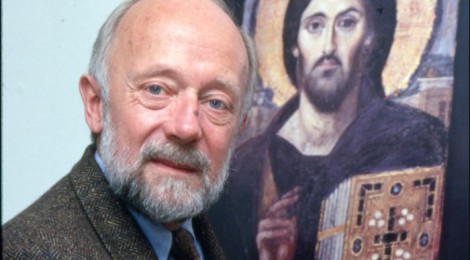
Remembering Marcus Borg: A Real Talker in the Wilderness
About one month ago, we lost Marcus Borg. This is a significant loss for our community at The Church of the Village, A progressive United Methodist community because for the last 20+ years Marcus Borg has been one of the primary public voices of Progressive Christianity. While I was the ministerial intern at COTV from 2012-13, Bishop Johnson and I co-led an adult study of Marcus Borg’s book, Meeting Jesus Again for the First Time. While reading the introduction to this book I remember being touched to learn that this scholar and writer had a very real connection to the Jesus he had discovered through rigorous study. As a seminarian at the time, I needed to hear that rigorous study could indeed co-exist with a strong personal faith life.
Our Lenten theme this year is “Real Talk in the Wilderness.” For many folks, the religious milieu, which was/is, filled with the conservative Christian rhetoric of judgment and condemnation, felt/feels like the wilderness. Marcus Borg was for many of us the voice of real talk in this wilderness. Many of us knew that if Christianity was what T.V. and radio preachers were proclaiming we wanted no part of it. What many of us didn’t know; however, was if there was anything in Christianity we could claim.
In his lectures, interviews, and many publications, Borg gave us back a Christianity we could claim. Borg publicly, repeatedly and consistently proclaimed that Jesus was a “Spirit person,” a “Prophet” falling in the Jewish prophetic tradition, and a “Revolutionary.” Further, Borg declared that Jesus’ primary message was that all people were called to have an intimate relationship with a loving and forgiving God, that the Kingdom of God, as opposed to the “system of domination,” was present and coming, and that all forms of oppression and domination needed to be critiqued and overcome wherever they were found.
I sometimes think that progressive Christians opt out of speaking out about the inclusive good news that we find in the gospels because we’ve been so turned off by pushy evangelists. This is understandable. However, the world needs to know that there is more than one interpretation of what Jesus’ life meant and more than one understanding of what the Bible proclaims as most vital. Recently I had the privilege of getting to hear retired United Methodist Bishop, Melvin Talbert, preach at Foundry UMC. One thing Bishop Talbert said that was very powerful was let’s make sure that those who disagree with us don’t get the last word on the Bible. Marcus Borg did this in a very real way.
On Facebook, one member of COTV, Chris Jorgenson, posted that when she was pregnant with her daughter a friend of hers recommended Borg’s book, The God We Never Knew. She wrote,
“It opened my heart and mind to the possibility of returning to Christianity. I could not be more grateful”.
Now, about ten years later, Chris is a seminarian at Drew and working toward becoming an ordained UMC pastor.
Similarly, while I was reflecting and preparing to write this blog, I went to my seminary’s library and as I was checking out three of Borg’s books, the student checking me out, unprompted, said, “I probably wouldn’t be Christian if it weren’t for him.” This sentiment rang out over and over, as I talked to people and researched about Borg.
I believe it is especially a testament to Borg that many conservative scholars and religious folks also spoke well and appreciatively of him. In his blog, God in the Midst of the City, the Very Reverend Barkley Thompson wrote that though he and Borg came to different understandings of Jesus:
Very many people who had left the Christian faith have returned to it through Marcus’ evangelism (though he would grimace at my use of the word, I suspect). Marcus was a Christian, a follower of Jesus Christ in word and in deed. He understood Jesus (and especially the Resurrection) differently than I do. But the veracity of his faith was clear. And calm. And passionate”. (https://rectorspage.wordpress.com/2015/01/21/my-friend-marcus-borg/)
Likewise, in an online article by Kevin P. Emmert for Christianity Today, Emmert wrote,
“What evangelical scholars are saying about [Borg] and his work”. One scholar quoted, Nicholas Perrin, professor of biblical studies at Wheaton College, said “we should thank Borg for forcing us to take seriously Jesus as a political thinker”. (http://www.christianitytoday.com/ct/2015/january-web-only/died-marcus-borg-liberal-jesus-scholar-and-friendly-provoca.html?start=1)
Church of the Village identifies strongly as a “Progressive, Reconciling church”. One way COTV understands and strives to live out this identity, as stated in our mission statement, is that “we are open-minded, but we also strive to be open-hearted and a true haven of acceptance for those who find their way through our open doors”. This statement of welcome must also apply to our Christian sisters and brothers who may be more conservative-minded or believe differently than us.
As we mourn the loss of this faithful, kind, well-versed scholar we can honor Marcus Borg by remembering his own words in Speaking Christian:
“I am confident that the one who has buoyed us up in life will also buoy us up through death. We die into God. What more that means, I do not know. But that is all I need to know”.
